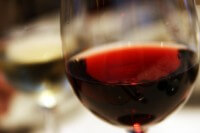 Last month, Wall Street Journal wine columnist Lettie Teague tackled the issue of wine ratings. For many of us, choosing the right red or white can be a bit daunting (unless your only consideration is price). But it’s hard to keep in mind all those recommended bottles we read about. So what catches our eye? Those numbers, often dangling from the neck of a bottle—93 points! 94 points! 97! How can you go wrong?
Last month, Wall Street Journal wine columnist Lettie Teague tackled the issue of wine ratings. For many of us, choosing the right red or white can be a bit daunting (unless your only consideration is price). But it’s hard to keep in mind all those recommended bottles we read about. So what catches our eye? Those numbers, often dangling from the neck of a bottle—93 points! 94 points! 97! How can you go wrong?
As Teague explains,
Distinctiveness and concentration are all well and good, but at K&L Wines in California, Burgundy buyer Keith Wollenberg says that if a wine received an 87, he isn’t likely to publicize the score. If it got a good review as well, Mr. Wollenberg might post the review without revealing the score. “The wine will sell better without the number,” Mr. Wollenberg said.
It isn’t that Messrs. Matthews [of Wine Spectator], Watkins [a N.J. wine retailer] and Wollenberg eschew the sub-90-pointers—in fact, Mr. Wollenberg said he drinks “a lot more 89-point wines” than he does 98-point wines. Wines at that lower number offer solid value and wide appeal, according to Mr. Wollenberg. And yet, it’s getting harder and harder for wine drinkers to find them. As Mr. Watkins observed, “It’s becoming rare to find a wine under 90 points.”
I recall being invited to lunch at the home of a wealthy Arizonan (I believe a former executive at Campbell’s) who lived out in Paradise Valley near Scottsdale. She and her husband built an above-ground wine cellar containing 3,000 bottles—many of them still had the wine ratings dangling from their necks. None were beneath the 90 range and a few were graded 100.
“Critics who score wines are more visible than critics who do not,” Teague writes. “And the bigger the number, the more likely it will be repeated somewhere. As Daniel Posner, owner of Grapes the Wine Shop in White Plains, N.Y., said, ‘If you slap 100-point scores on wines, retailers will start using your name.’ Mr. Posner sells wines without scores via his email offerings to a devoted clientele but acknowledged than an email featuring a 100-point wine will guarantee much a greater response. Mr. Posner said he’s not a point advocate but simply a pragmatist. ‘I’m a businessman,” he said. “I have a family, and at the end of the day I have bills to pay.'”
In a labor of love, Teague goes on the hunt for respectable 88-point wines and makes several recommendations, including a 2008 Pio Cesare Oltre for $21 and a 2011 Schloss Gobelsburger Riesling from Kamptal, Austria, for $17.
Photo courtesy of Quinn Dombrowski